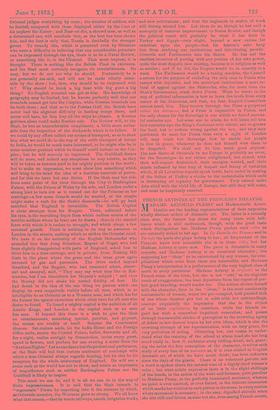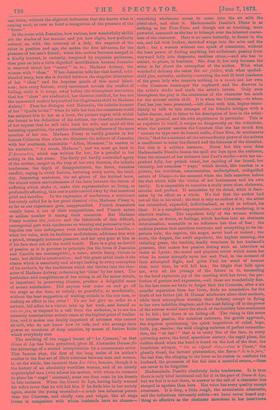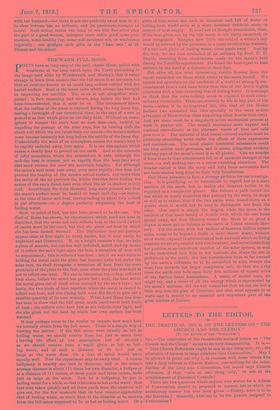FRENCH ARTISTES AT THE PRINCESS'S THEATRE.
IVADAME ARNOULD PLESSY and Mademoiselle Aim6e Descl6e are the leading representatives of their respective wholly distinct orders of dramatic art. The latter is a recently risen star, the former has shone for many years with bril- liance which is still undimmed, though, with the good taste which distinguishes her, Madame Plessy prefers such roles as are naturally suited to her age. In La Bataille des Fonnies and in Tartufe the parts she plays belong to her ; all frequenters of the Francais know how inimitable she is in those roles, but her Madame Aubray is quite new. The piece is detestable in many respects, and Madame Aubray is an unnatural character ; but supposing her " ideas" to be entertained by any woman, the com- plications which arise from them are reasonable, and Madame Plessy's interpretation is a performance of the very highest class of merit in every particular. Madame Aubray is oriyinale in the French sense of the term, but she is not " odd," as the slightest touch of exaggeration, the least departure from the repose of per- fect good-breeding, would render her. The actress clothes herself with the character, lives in the " ideas," is the most consistently unreasonable of women, wears the pre-occupied, half-puzzled look of one whose theories put her at odds with her surroundings, conveys exquisitely the impression that she is the object of no little exploitation by outsiders, while her friends re- gard her with a somewhat impatient veneration, and passes through innumerable shades of perception to the crowning agony of defeat in her dearest hopes by her own ideas, which is also the crowning triumph of her representation, with an easy grace, the very perfection of acting. Observing her, one comes to under- stand what the training of the school at whose head she has long stood really is ; how it embraces every trifling detail, and, grant- ing the artist the free conception of the character, involves such study of every line of its tournure as, if it ever existed in English dramatic art, of which we have much doubt, has been unknown since the days of the giants. There is no vehement gesture, not a word is spoken above the natural tone of a highly-bred woman's voice ; but what subtle expression there is in the slight shifting@ of the hands, in the action of the wrist and forearm, quite peculiar to Madame Plessy, in the perfectly enunciated sentences, wherein no point is ever omitted, or ever forced, in the delicate intonation which marks her relation to each person in the scene, in every motion where movement is necessary ; in the easy, dignified attitude when she sits still and listens, as none but she, even among French actors,
can listen, without the slightest indication that she knows what is coming next, or ever so faint a recognition of the presence of the " house."
In the scene with Jeannine, how various, how wonderfully skilful are the shades of her manner, and yet how slight, howAperfectly natural, as, with the courtesy of a lady, the superior of the other in position and age, she makes the first advances, for the pleasure of her son's friend ; when this motive becomes merged in a kindly interest, in curiosity, tempered by exquisite politeness, then goes on into a little dignified mortification because Jeannine is reserved about her " secret " to her, Madame Aubrey, the woman with " ideas." When Jeannine tells her that horrid, cold- blooded story, how she is divided between the singular illustration of her " ideas " and the hopeless puzzle of this moral blind- ness; how every feature, every movement reveals the conflict of feeling, until it is swept away before the triumphant conviction that her " ideas" are vindicated, her theories justified, for has not the unmarried mother bequeathed her illegitimate child to Madame Aubrey ? Then her dialogue with Rabantin, the infinite humour of her " Quelle bOtise !" when he tells her that the censorious world has assigned him to her as a lover, the patient regret with which she listens to his definition of his notions, the cheerful confidence of her request that he will take back his wife, and amid all this harassing opposition, the sadden transforming influence of the mere mention of her son. Madame Plessy is hardly grander in her famous Celimene than when she dismisses the seducer of Jeannine with her courteous, inexorable "Adieu, Monsieur," in answer to his tentative, " An revoir, Madame "; and we must go back to L'Aventuribv, which was written for her, for a parallel to her acting in the last scene. The finely yet hardly controlled agony of the mother, caught in the trap of her own theories, the infinite tenderness, the depth of disappointment, the fierce, voiceless conflict, raging in every feature, torturing every nerve, the brief, dry, despairing sentences, the set gloom of the knitted brow, the almost entire motionlessness of the form between the throes of suffering which shake it, make this representation so living, so profoundly affecting, that one is quite carried away by that maternal grief and sacrifice. In the expression of tenderness, a sentiment but rarely called for in her great classical roles, Madame Plessy is, so far as our experience goes, unapproached. French dramatists usually leave it ont of their compositions, and French actors as seldom number it among their resources. But Madame Plessy touches the fadeurs and the falsehoods of this difficult, uncongenial part with tenderness so winning and persuasive that it beguiles one into indulgence even towards the odious Camille,— when her voice, with its faultless modulations, addresses him with a proud, strangely innocent pleasure, and her eyes gaze at him as if his face shut out all the world beside. Here is a play as devoid of passion as it is perverse in principle (for the loves of Jeannine and Camille are contemptible), a mean, sterile fancy, vicious in taste, but skilful in construction ; and this great artist lends it the charm which is essentially and always lacking to every conception of its author's, by the tenderness which she throws into the char- acter of Madame Aubrey, redeeming her 'ideas' by her heart. The "perfection and completeness of her acting in all the minor details, so important in preserving illusion, produce a delightful sense of secure satisfaction. Did anyone ever come on and go off the stage as she does, so calmly, so gracefully, so accidentally, without the least suggestion of waiting outside in the one case, or making an effect in the other ? To see her give an order to a servant, bid adieu to a visitor, take up her work, seat herself au coin du feu, or respond to a call from the audience, is to see the minutely conscientious artistic sense at the highest point of realisa- tion, and it makes one doubly impatient of actresses who cannot sit still, who do not know how to talk, and who arrange their gowns on occasions of deep emotion, by means of furtive kicks which everybody sees.
The soothing of the rugged breast of " La Censure," so that Diane de Lys has been permitted, gives M. Alexandre Dumas ft/8 the advantage of a second interpretation by a consummate artist. This famous play, the first of the long series of its author's studies in the fine art of illicit relations between men and women, is, on the whole, less immoral than Les Idees, because, though it is the history of an absolutely worthless woman, and of an utterly unprincipled man (who adores his mother, with whom he consents to place his " angel" mistress), some one does come by his deserts in this instance. When the Count de Lys, having fairly warned his wife's lover that he will kill him if he finds him in her society again, shoots the young scoundrel-A–a much less infamous person than the Countess, and chiefly vain and vulgar, like all stage lovers in comparison with whom husbands have no channe- something wholesome seems to come into the air with the pistol-shot, and clear it. Mademoiselle Desclee's Diane is as striking as her Frou-Frou, and though not so touching, more powerful, inasmuch as She has to triumph over the inherent coarse- ness of the character. Here is no mere butterfly, to flaunt in the sun, and fall with broken, smirched wings into the mire and the dark ; but a woman without one spark of conscience, without the least power of feeling anything but selfishness, passing from wayward folly into desperate, reckless crime,—and she has to attract, to please, to fascinate. She does it, but only because the artist is far above the conception of the author. With what wonderful delicacy she takes the air foldtre, with what spoiled- child glee, curiosity, audacity—covering the real ill-bred insolence of the great lady who respects nothing in a monde not her own —the Countess rummages the cupboard and the drawers in the artist's studio and reads the artist's letters. Only once throughout the play is the coarseness of the character too much for the actress' subtle skill. It is when the Countess,—to whom Paul has just been presented,—left alone with him, begins imme- diately to talk to this stranger of his friend's intrigue with a ballet-dancer, and to listen to his description of love in the artist- world in general, and his own experiences in particular. This is so repulsive in itself, it verges so dangerously on the ridiculous, when the painter assures the Countess that she has struck him " comme un type rare de beaute noble, d'Anse &re, de sentiments eleve-s," that for a moment all the extraordinary power of the actress is insufficient to cover the discord and the falseness of the situation. But this is a solitary instance. Never but this once does Mademoiselle Desclee loosen the spell she lays upon the audience, from the moment of her entrance into Paul's studio—with her im- prudent folly, her pettish ennui, her cajoling of her friend, her curiosity, her countless " ways," which sketch, like touches in a picture, the worthless, conscienceless, undisciplined, undignified nature of Diane—to the moment when she falls senseless before the shot which kills the victim of her lawlessness and his own vanity. It is impossible to conceive a study more close, elaborate, minute, and perfect. It astonishes by its detail, while it fasci- nates by its effect as a whole. We feel that the author had not all this in his mind ; the text is only an outline of it; the artist has intensified, expanded, individualised, as well as refined, his ideal. It is a complete impersonation,—not only a rendering, it is absolute realism. The impulsive folly of the woman without principles, or duties, or feelings, which hardens into an obstinate determination, amenable to no influence but that of fear ; the reckless passion that sacrifices everyone and everything to its im- perious rule; the caprice, the anger, never loud or violent ; the scorn, the despair, the swift expedient, the hapless cunning,.the unfailing grace, the terrible, deadly weariness in her husband's presence, that makes her passive during such an interview as theirs at Lyons ; the moral and physical terror which seizes her when he comes abruptly upon her and Paul, in the moment of their attempted flight, and gives Paul his word of honour that, next time, he will kill him ; the blight that falli upon her, with all the presage of the future in it, succeeding to the brief rapturous joy of the meeting with her lover, the per- fection of gesture and expreasion,—all these are wonderfully fine. In the last scene we have to forget that the Countess, after a six months' separation from her lover, finds no consolation for the death of her father (all M. Dumas' adulterers adore their mothers, while their accomplices worship their fathers) except in flying to her own indelible disgrace, and the least falling-off in the power of the actress would leave the shock of the horribly false sentiment to be felt ; but there is no falling-off. The rising in this scene to intense passion, the noiseless entrance, the gentle approach, the hopeless questioning, the quick inspiration of relief, hope, faith, joy, resolve ; the wild clinging embrace of perfect reconcilia- tion, the "at last !" that is in every line of the face, in every quivering nerve, the brief, speechless ecstacy, the rapid plans, the sudden shock when the hand is heard on the lock of the door, the breathless whisper, " On ne re'pond rien,—c'est is Comte," the ghastly dread, the fervent protestation, the fierce "Je te le jure," the last kiss, the clinging to the lover as he rushes to confront the husband, the proneness of her fall into a merciful swoon,—these are never to be forgotten.
Mademoiselle Desclee absolutely lacks tenderness. It is true there is only brief incidental call for it in the part of Diane de Lys, but we feel it is not there, to answer to the call of a character less steeped in egotism than hers. Her voice has every quality except sweetness. It is deep, a little rough, the enunciation admirable, and the inflections extremely subtle—we have never heard any- thing so effective as the obstinate monotone in her interviews with her husband—but there is not one perfectly sweet tone in it ; its clear lowness has no softness, and its passionate strength no music. Such acting makes one long to see this fine artist play the part of a good woman, interpret some noble grief, some pure emotion, some healthy joy, some well-savoured wit, or wholesome ingenuity ; one grudges such gifts to the "base uses" of M. Dumas and his school.




































 Previous page
Previous page